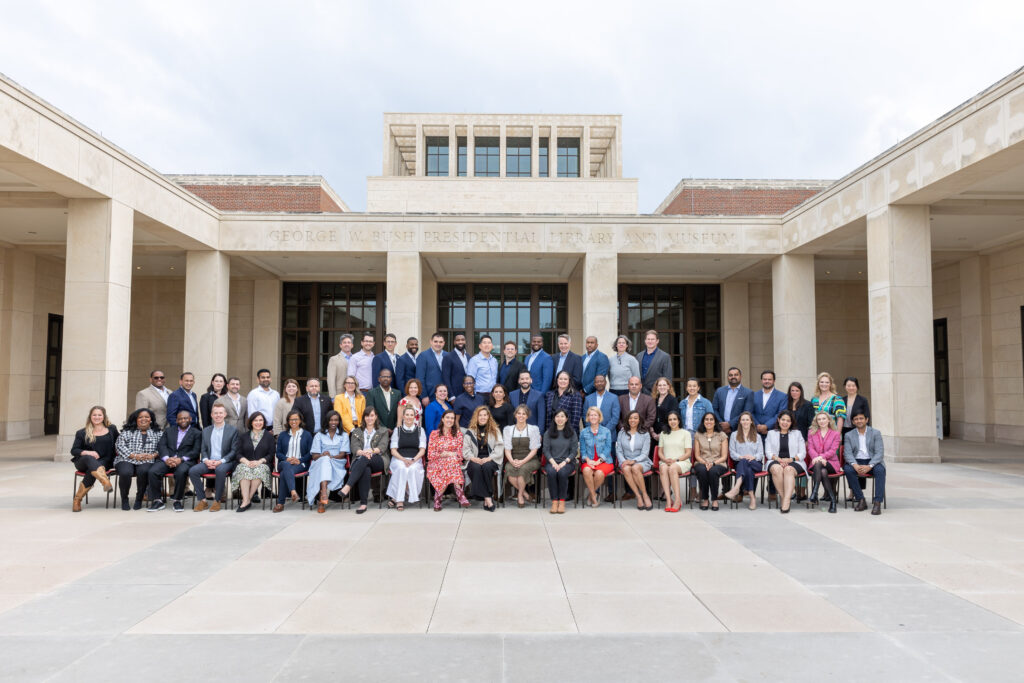The forecast was overcast, but spirits were high as the PLS Class of 2024 met for the fourth time at the George W. Bush Presidential Center in Dallas, Texas.
The theme of the module was decision-making, and, over the course of three busy days, Scholars were able to delve into it through sessions with PLS faculty and speakers. Scholars heard from President George W. Bush, who joined them for a moderated conversation and Q&A; Mrs. Laura Bush, who joined them for a tour of the Laura W. Bush Native Texas Park; Keith Hennessey, Assistant to the President for Economic Policy and Director of the National Economic Council in the Bush Administration and David Rubenstein Fellow at the George W. Bush Institute; Karen Hughes, who served in the Bush Administration in various capacities, including as White House Communications Director; Dan Bartlett, former Counselor to President Bush and Executive Vice President of Corporate Affairs at Walmart; and Arthur Brooks, author, social scientist, and professor at Harvard University.
The module began on Thursday afternoon, with a classroom session led by Brooks on the topic of leadership and happiness. He told the Scholars that happiness isn’t just a feeling, but, rather, something that can be studied and put into practice and, most importantly, shared with others.
He suggested the Scholars think about a simple formula as they work toward fostering happiness – both as leaders and in their own lives – and defined happiness as the sum of enjoyment, satisfaction, and meaning.
Brooks also spoke to the Scholars about the importance of remaining optimistic about the future, even in the face of hurdles. He encouraged them to consider how they think about progress, saying, “Progress is possible because the present is not as good as it could be.”
Later in the afternoon, Scholars heard from Bartlett, who took part in a moderated conversation with Kevin Sullivan, Senior Advisor at the George W. Bush Presidential Center and former White House Communications Director. Bartlett spoke about his time in the White House and the valuable leadership lessons he learned, including from some of the administration’s most difficult moments, such as the 9/11 terrorist attacks and Hurricane Katrina.
That evening, Scholars had the opportunity to tour the George W. Bush Presidential Museum, with exhibits that showcase the life and administration of President Bush, as well as his post-presidency. The Scholars also walked through the Museum’s special exhibit, Freedom Matters, which explores the ongoing pursuit of freedom and liberty.
Friday morning saw gray skies, but the rain held off long enough for the Scholars to enjoy a tour of the Laura W. Bush Native Texas Park, accompanied by Mrs. Bush herself. The Native Texas Park is a 15-acre oasis in the heart of Dallas featuring 974 Texas trees, grasses, and flowers. Guided by Master Naturalists from the Bush Center, the Scholars had the opportunity to learn more about the flora and fauna that characterize the native Texas landscape.
That afternoon, Scholars were able to put their leadership lessons into practice by taking part in a simulation exercise. Led by Hennessey, they worked in groups, and with advisors, to tackle a real-world problem.
That evening, Scholars had the privilege of hearing from President Bush, who took part in a Q&A moderated by PLS Co-Director Kelley Jiou. He told the Scholars how he approached tough decisions during his presidency and encouraged them to be active and conscientious citizens.
“You can make a difference in people’s lives and should,” he said. “You have a duty as a citizen to not sit on the sidelines but to be an active participant. Here’s the thing about America: All across the country, millions of people are performing acts of mercy without government edict, which really makes us a unique place. To the extent that you continue to do that is a personal responsibility of yours as a good citizen. It enables our country to be unique and great.”
On Saturday, Scholars heard from Hughes, who took part in a moderated conversation with Anne Wicks, the Don Evans Family Managing Director of Opportunity and Democracy at the George W. Bush Institute. Hughes, drawing from her experience as White House Communications Director, spoke about the importance of clear communication in leadership, telling the Scholars, “Communications is both an art and a science. The art comes from the experiences, and the science comes from the data.”
Hughes also said listening is an important skill that ties into effective communication: “I think the skill that’s most important to me is [being] an intent listener. You have to really, really listen to people. And then what that means is that you learn from them.”
As the module drew to a close, and Scholars said goodbye for now, they were left with many valuable messages to ponder on how communication and decision-making are integral parts of their leadership journeys. As they prepared to head back to their lives, jobs, and families, Hughes had one final message for them: Beyond the formal lessons of effective leadership, what’s especially important is connection – taking the time to foster common interests with the people you love and work with.
Her suggestion to the Scholars was simple yet meaningful: “Just take your best friend to lunch every once in a while!”
View more photos of Module Four here.
Later this month, the Presidential Leadership Scholars will travel to the Lyndon B. Johnson Presidential Library and Museum in Austin, Texas, for Module Five, to learn about influence and persuasion.

